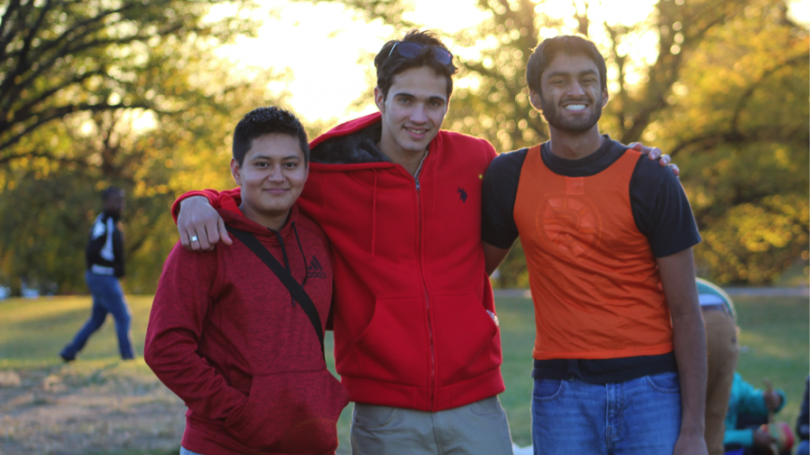
- About
- Programs
- Student Opportunities
- For Faculty
- News & Events
Back to Top Nav
Back to Top Nav
Back to Top Nav
Back to Top Nav
Back to Top Nav
by Milan Chuttani '18
During the fall of 2016, Milan Chuttani '18 interned with the International Rescue Committee in Baltimore, Maryland. Names have been modified to preserve the anonymity of IRC clients.
I have always been passionate in making people feel welcome in communities I care about. As a student of international relations, I am also fascinated by the consequences of wars, politics, and rivalries between world powers. Interning with the Asylee Case Management team at the International Rescue Committee resettlement office in Baltimore provided me the unique ability to combine both of these interests, to work with people fleeing war and persecution from around the world, and to welcome them into their new American communities.
The department where I worked meets directly with over two hundred asylees and refugees, helping them receive professional medical care, food stamps, employment and financial assistance. There are only two case managers working in the asylee department, so I was given immense responsibility over these cases. I met directly with clients, listened to their stories, and figured out ways that they can better adapt to their new American lives. Often I met with government agencies, such as the Department of Social Services, to help enroll asylees in Obamacare and food stamp programs. I also distributed State Department funded checks to clients each month, to help them pay for their rent, gas, and other necessities.
Near the end of my internship, the Baltimore IRC office held a community appreciation event at a nearby church. The event provided our staff the opportunity to thank people who collaborate with our organization and with our refugee clients. I stood in the back of church with Mohammed, a tall, quirky 22-year-old Iraqi refugee that I had become especially close with.
The guest keynote speaker, a local politician from Maryland, opened the night. Speaking in waves of passion, arms rising above his grey hair and pale face, he congratulated donors and volunteers on helping Syrian refugees. He described our clients as cold, hungry, tired and weak families, welcomed with open arms into communities. He called us "heroes . . . reaching down, lifting Syrians up and saving their lives."
Mohammed chuckled next to me, saying in broken English, "That man does not talking about me." He smiled. I shrunk farther back in the audience, embarrassed, praying that neither Mohammed nor our other asylee guests could understand the way the congressman described them. Despite having lived in camps across Iraq, Syria and Turkey, Mohammad and his family all possessed a warm sense of humor and pragmatic resilience. They proudly worked night shifts at a jewelry factory to make ends meet, and burst into our office smiling on Monday mornings to show us their newest paystubs. Certainly they were not the ones being "saved" by our team.
The refugees I've met certainly are not the stereotypical weak and feeble people the politician described. In fact, we worked each day to empower people to move beyond this unflattering image. I have been consistently humbled by our clients, people who inspire me each day to work towards building a more hospitable world. Women like Zahra, who learned six languages fluently by watching foreign TV programs in Afghanistan, and now translates at the John's Hopkins trauma center. Or Carine, a sixteen-year old asylee from Cameroon who waited eight years to rejoin her father in Baltimore. While most American girls her age are learning high school algebra, she's starting college nursing courses. Many of our clients were forced to flee promising careers by war and conflict. Aasif, an interpreter for the U.S. Army in Afghanistan, is pumping gas right now in a Baltimore suburb, preparing for the day he can start his own company in Washington. And Aamira, a woman who wraps sandwiches at a local deli in her brightly colored hijab, once ran a large non-profit consulting firm in Sudan.
Our clients will accomplish incredible things in their new American communities, and many are already underway building these dreams. This term has taught me to treat refugees and asylees with the respect they deserve. Our nation should believe in them, too. Because at the end of the day, unless our nation can move past viewing immigrants as "weak and feeble refugees," we can never fully embrace the powerful, intelligent, savvy, frustrated and complex individuals they truly are.
At Dartmouth, I study refugee and migration issues at a policy level, examining how wars, ethnic conflict, and political persecution can influence countries around the world. Viewing conflicts through this broad, academic frame of study, it's easy to lose touch with the individual people at risk. Working at the IRC has changed that for me. I no longer think of the conflicts solely in terms of statistics or the government policies that caused them. Rather, I think of the individual people at stake, the doctors, farmers and businessmen I have met who fled conflicts and found their way to Baltimore. Excited people, fearful people, people passionate and frustrated and eager to accomplish incredible dreams: these are no longer just the faces of complex global conflicts, but also the leaders of up and coming neighborhoods across America.